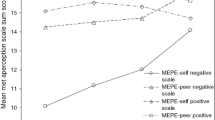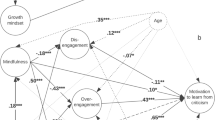Abstract
This study compares the motivation and the quality of criticism responses of 697 undergraduates who were divided into three levels of situation legitimacy (high, moderate, and low) and two levels (top versus bottom 40 percent) of anxiety related to previous generalized assertiveness behaviours. The impact of gender was also studied. The results showed the legitimacy of the situation for a critical response (preassessed with peer hold-out groups) significantly affected participants' motivation to criticize as well as the quality of their critical responses, notwithstanding the poor quality of all criticism responses. Anxiety related to previous global assertiveness was related to high motivation but not to quality of criticism responses. There were no gender effects. Results are interpreted within an avoidance learning paradigm wherein the connotative meaning of criticism is incongruent with harmonious long-term relationships so that it is suppressed until virtually forced by the specifics of highly legitimate situations.
Similar content being viewed by others
References
Ajzen, I. & Fishbein, M. (1980). Understanding attitudes and predicting social behaviour.Englewood Cliffs, N.J.: Prentice Hall.
Alden, L. & Cappe, R. (1981). Nonassertiveness: Skill deficit or selection evaluation? Behavior Therapy 12: 107–114.
Alden, L. & Safran, J. (1978). Irrational beliefs and nonassertive behavior. Cognitive Therapy and Research 2: 357–364.
Bandura, A. (1982). Self-efficacy mechanism in human agency. American Psychologist 37: 122–147.
Baron, R. (1990). Countering the effects of destructive criticism: The relative efficacy of four interventions. Journal of Applied Psychology 75: 235–245.
Bates, H. D. & Zimmerman, S. F. (1971). Toward the development of a screening scale for assertive training. Psychological Reports 28: 99–107.
Bern, S. L. (1974). The measurement of psychological androgyny. Journal of Consulting and Clinical Psychology 42: 155–162.
Bright, D. (1988). Criticism in your life. New York: Master Media.
Bruch, M. A. (1981). A task analysis of assertive behavior revisited: Replication and extension. Behavior Therapy 12: 217–230.
Butler, P. (1981). Self assertion for women. New York: Harper & Row.
Chiauzzi, E. & Heimberg, R. G. (1986). Legitimacy of request and social problem solving: A study of assertive and nonassertive subjects. Behavior Modification 10: 3–18.
Cooley, M. L. (1979). Interests of assertiveness trainees. Journal of Counselling Psychology 26: 173–175.
Curran, J. P. & Monti, P. M. (Eds). (1982). Social skills training: A practical guide for assessment and treatment. New York: Guilford Press.
D'Zurilla, T. J. & Goldfried, M. R. (1971). Problem solving and behavior modification. Journal of Abnormal Psychology 78: 107–126.
D'Zurilla, T. J. & Nezu, A. (1980). A study of the generation-of-alternatives process in social problem solving. Cognitive Therapy and Research 4: 67–72.
D'Zurilla, T. J. & Nezu, A. (1982). Social problem solving in adults. In P. Kendall (Ed.), Advances in cognitive-behavioral research and therapy (Vol. 1, pp. 201–274). New York: Academic Press.
Fiedler, D. & Beach, I. R. (1978). On the decision to be assertive. Journal of Consulting and Clinical Psychology 46: 537–546.
Fishbein, M. & Ajzen, I. (1975). Belief, attitude, intention, and behavior. Reading, MA: Addison-Wesley.
Galassi, M. D. & Galassi, J. P. (1978). Assertion: A critical review. Psychotherapy: Theory, Research, and Practice 1: 16–29.
Galassi, J. P. & Galassi, M. D. (1979). A comparison of the factor structure of an assertion scale across sex and population. Behavior Therapy 10: 117–129.
Gambrill, E. D. & Richey, C. A. (1975). An assertion inventory for use in assessment and research. Behavior Therapy 6:550–561.
Heimberg, R. G., Chiauzzi, E., Becker, R. E., & Madrazo-Peterson, R. (1983). Cognitive mediation of assertive behavior: An analysis of the self-statement patterns of college students, psychiatric patients, and normal adults. Cognitive Therapy and Research 7:455–463.
Heimberg, R. G., Montgomery, D., Madsen, C. H., & Heimberg, J. S. (1977). Assertion training: A review of the literature. Behavior Therapy 8: 953–971.
Kirschner, N. M. (1976). Generalization of behaviorally oriented assertive training. Psychological Record 26:117–125.
Kuperminc, M. & Heimberg, R. G. (1983). Consequence probability and utility as factors in the decision to behave assertively. Behavior Therapy 14: 637–646.
Maddux, J. E., Norton, L. W., & Stoltenberg, C. D. (1986). Self-efficacy expectancy, outcome expectancy, and outcome value: Relative effectives on behavioral intentions. Journal of Personality and Social Psychology 51: 783–789.
McCarrey, M., Piccinin, S., Welburn, K., & Chislett, L. (1989). Devaluation by women of self-reported criticism skills. Journal of Social Psychology 130: 317–323.
McFall, R. M. & Lillesand, D. B. (1971). Behavior rehearsal with modeling and coaching in assertion training. Journal of Abnormal Psychology 76: 295–303.
Nevid, J. S. & Rathus, S. A. (1979). Factor analysis of the Rathus Assertiveness Schedule with a college population. Journal of Behavior Therapy and Experimental Psychiatry 10: 21–24.
Piccinin, S. (1986). Assertiveness interests of seniors. Unpublished paper. University of Ottawa, Ottawa, Ontario, Canada.
Piccinin, S., McCarrey, M., Welburn, K., Chislett, L., Bourgon, G., & Scott, J. (1990). Short versus long term gains of a cognitive-behavioral social skills program targeting the giving and receiving of criticism. Current Psychology: Research & Reviews 9: 385–395.
Piccinin, S., McCarrey, M., Welburn, K., Chislett, L., Bourgon, G., & Jacques-Locmelis, W. (1992). Impact of treatment adherence intervention on a social skills program targeting criticism behaviors. Canadian Journal of Counselling 26: 107–121.
Rich, A. R. & Schroeder, H. E. (1976). Research issues in assertiveness training. Psychological Bulletin 83: 1081–1096.
Weisinger, H. & Lobsenz, N. M. (1981). Nobody's perfect: (How to give criticism and get results). New York: Warner Books.
Young, E. R., Rimm, D. C, & Kennedy, T. D. (1973). An experimental investigation of modeling and verbal reinforcement in the modification of assertive behavior. Behaviour Research and Therapy 11: 317–319.
Author information
Authors and Affiliations
Rights and permissions
About this article
Cite this article
Piccinin, S., Mccarrey, M., Fairweather, D. et al. Impact of situational legitimacy and assertiveness-related anxiety/discomfort on motivation and ability to generate effective criticism responses. Curr Psychol 17, 75–92 (1998). https://doi.org/10.1007/s12144-998-1022-7
Accepted:
Issue Date:
DOI: https://doi.org/10.1007/s12144-998-1022-7




